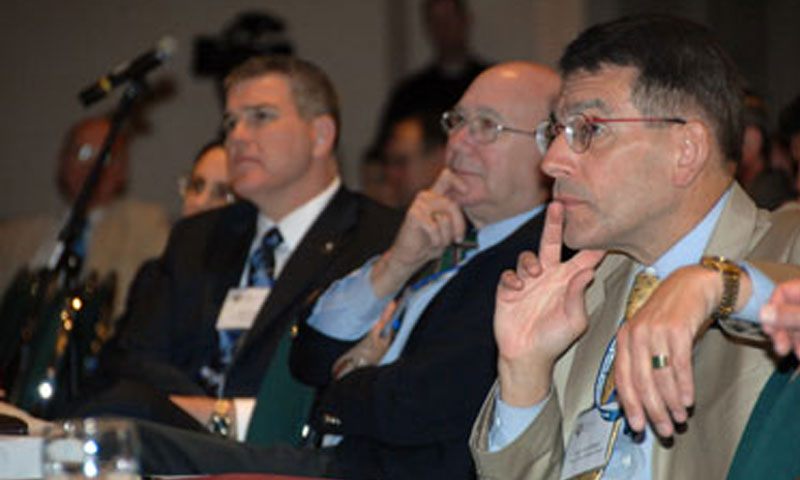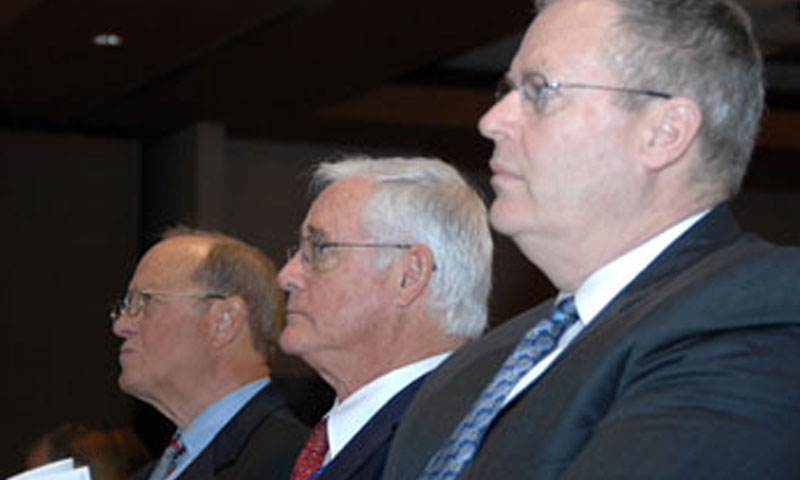As the U.S. faces two wars overseas and an economic struggle here at home, the issue of military acquisition is as pressing as it has ever been. NPS’ Acquisition Research Program looked to contribute to the conversation with the 7th Annual Acquisition Research Symposium, May 11-13, where over 300 attendees gathered from around the country. Following the theme “Creating Synergy for Informed Change,” the symposium offered the audience an opportunity to ask questions of the presenters and share dialogue on various acquisition-related topics from across the services and departments.
The setting provides a diverse forum for defense acquisition peers to discuss research on various DoD related research topics, with experiences and expertise ranging across the board. “These senior officials from the defense department, academia and industry really have no other forum to gather like this and discuss original research on the defense department’s acquisition processes, policies and procedures,” explained Acquisition Chair retired Rear Admiral Jim Greene.
This year’s symposium proved to be as popular as ever, attracting distinguished speakers and presenters from around the world. Leading on day one as the keynote speaker, Under Secretary of the Navy, The Honorable Robert O. Work, welcomed attendees and expressed the importance of acquisition research to meet the challenges in today’s budgetary climate.
“I can’t think of anything more important than acquisition research and acquisition excellence right now,” said Work. “We need research, just as this symposium is designed to do, to allow us to make good decisions. One of the things we’re grappling with is we’re trying to bring in 5,000 acquisition professionals. Should we bring in more contracting officers? Should we bring in more people who are cost estimators? Should we bring in more engineers? What is the highest payoff for the department? So this type of [research] symposium really helps us make the decisions on how we will get the highest payoff in the department.”
He, along with many speakers throughout the week, noted points from a series of speeches recently given by Secretary of Defense Robert Gates. Gates is known for his hard-line stance on the defense budget, and his efforts to get military and civilian officials working towards more efficient spending. He regularly expresses the need for effective combat capability to be available to the warfighter in a timely manner, to ensure the safety and success of our troops overseas. Funds, however, are not as plentiful as they once were.
“The attacks of September 11, 2001, opened a gusher of defense spending that nearly doubled the base budget over the last decade, not counting supplemental appropriations for the wars in Iraq and Afghanistan,” stated Gates in a May 8 speech at Eisenhower Library in Abilene, Kan. “Which brings us to the situation we face and the choices we have today – as a defense department and as a country. Given America’s difficult economic circumstances and perilous fiscal condition, military spending on things large and small can and should expect closer, harsher scrutiny. The gusher has been turned off, and will stay off for a good period of time.”

Dr. Karl van Bibber, NPS Vice President and Dean of Research, joins a packed house of attendees at the 7th Annual Acquisition Research Symposium for opening remarks from The Honorable Robert O. Work, Under Secretary of the Navy. The symposium looked at various aspects of defense spending and allowed presenters to showcase their original research papers. The symposium coincided with a series of speeches recently given by Defense Secretary Robert Gates on the importance of knowing what to buy and what standards to place on acquisitions.
Gates’ speech came only days before the symposium, setting the tone for dialogue surrounding acquisition research, processes and policies. The issues of what to buy, who to buy from, and what kind of standards to aim for are among the most pressing in the acquisition process today.
Concerns for the future of acquisitions were also echoed by Dr. Jacques S. Gansler, Under Secretary of Defense for Acquisition Technology and Logistics from 1997-2001, and a plenary session chair and keynote speaker for the symposium every year since it began in 2003.
“The nation is obviously [facing] fiscal problems, as is the world, in terms of Medicare, Social Security, Medicaid, and the debt structure building up huge shares of the budget. Defense is going to have a problem. It’s not going to get the $100 billion it’s getting this year. And as a result, we have to worry about getting more for less,” explained Gansler. “That’s the challenge for the future, and the security area is expanding in terms of things we have to deal with. We have to be able to deal with everything from pirates and terrorists on one end of the spectrum to regional conflicts, peer competitors, nuclear concerns and getting drawn into some regional conflicts – this huge spread of instability in the world.”
Gansler stressed the need to provide the warfighter with the best possible equipment for the cost. Standards, he noted, should be set to ensure that quality is never compromised for the sake of savings.
“Today, every single U.S. weapon system has a foreign part in it. At least one. That’s because it’s better, not because it’s cheaper. It’s better. And we have to recognize that,” noted Gansler. “Now we obviously still worry about vulnerability, jobs in America and so forth. But our first and primary objective for national security is national security.”
Cost was also the topic of conversation at many of the symposium panels, which showcased the 69 original research papers selected to be featured at the symposium. Taking his place on a panel featuring distinguished acquisition professionals, NPS student Lt. Nicholas A. Meyers presented his research thesis titled, “An Economic Analysis of Investment in the United States Shipbuilding Industry.”
Meyers is a student of the Graduate School of Business and Public Policy set to graduate in June, and was the only student to present research in the panels. His hard work and extensive research earned him a rightful place on the panel alongside Mr. James E. Thomsen, Principal Civilian Deputy, Assistant Secretary of the Navy (Research, Development & Acquisition), Rear Admiral David H. Lewis, Vice Commander, Naval Sea Systems Command and Dr. Nayantar Hensel, Chief Economist for the Navy.
Meyers outlined the economic state of the shipbuilding and repairing industry, and why the need for investments is pressing. “As politicians seek to stimulate and sustain U.S. economic growth, they hope to create or maintain jobs, expand national gross domestic product, and provide a lasting resource for future economic potential,” stated Meyers in his thesis paper. “Investments in shipbuilding ardently accomplish all three goals, as [my] study will seek to demonstrate.”

NPS Acquisition Chair, Retired Rear Adm. Jim Greene sits alongside keynote speakers The Honorable Jacques Gansler and The Honorable Robert O. Work during the 7th Annual Acquisition Research Symposium. The Symposium featured 69 original research projects on the topic of acquisitions, and gave participants a chance to share their expertise with over 300 attendees from around the country.
The projects and topics presented at the symposium were just a fraction of the total number of papers submitted for consideration. In fact, the number and quality of papers submitted was so impressive that organizers increased both the number of presenters per panel and the number of panels to accommodate more projects. The ambitious agenda proved to be a huge success, prompting the Acquisition Research Program team to already start planning for next year’s symposium, set for May 11-12, 2011.
“[This symposium] was the best we’ve had. It was terrific,” said Greene. “The papers and the speakers were extraordinary. Our attendance was maxed out. We had to actually turn people away. And the audience participation was fantastic. It’s going to be very, very hard to top this performance next year.”
As DoD’s acquisition process, policies and procedures continue to evolve, NPS’ Acquisition Research Program strives to lead the way by producing quality research products and bringing together top acquisition officials, academics and industry to create an active dialogue on the pressing issues of the day. With over 600 research products contributed to date, the Acquisition Research Program at NPS continues to significantly enhance the body of knowledge in and about the defense acquisition community.
“If we had one word to describe the security situation for the future, it’s uncertainty,” said Gansler. “Now how do we prepare for uncertainty? It was easy to prepare for the Cold War. We just had to keep matching the Russians ship for ship, plane for plane, tank for tank. That’s not the environment of the future. We have this huge spread with less money. How do we handle that? That’s the challenge. That’s the acquisition challenge.”

